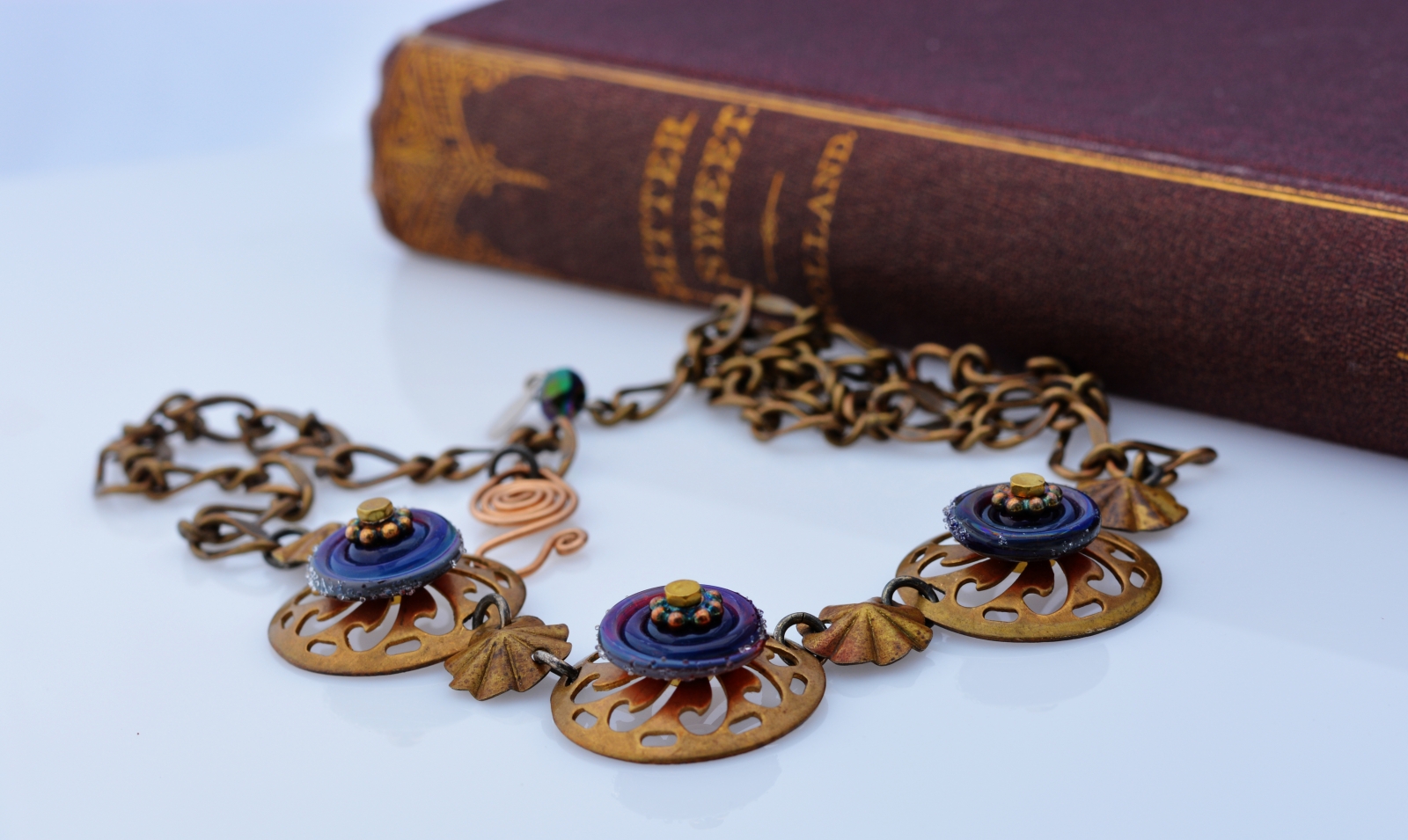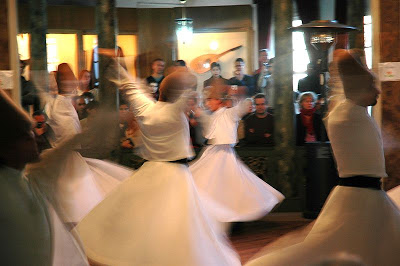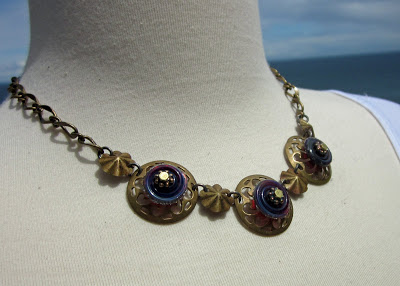Ideas for jewelry have been percolating within this ole brain of mine both consciously and unconsciously ever since we visited Turkey. There was so much visual inspiration to take in that I've allowed it to settle before sketching and designing. The first necklace I designed was mostly clear in my mind, but it's still not finished as I critique it day to day. It's not that it's complicated either. It's that my muse kept interrupting me. I found myself just picking up pieces of metal and lampwork and before I really knew what had happened I'd created Whirling Dervish.

I know some of you won't believe me, but I seriously have no recollection of a plan or even a thought about creating a piece of jewelry based on the Mawlawi Order (subset of the Sufi Order) of Dervishes. Once it started coming together though I got more and more excited imagining the colorful possibilities with just a change in the lampwork! I'll be making a few more of these, but they all will be different by the lampwork disks I choose. They will be very limited in number, as I'm using vintage brass and a very small stash of it.
If you've never watched the Amazing Race (Season 7) nor gone to Turkey you may not know what a Whirling Dervish is. Until I looked deeper into the group I thought they were just doing a folk dance similar to other folk dances in Russia.
Although it is performed today for tourists, it is actually part of a ceremony where four whirling dervishes, representing the moon spin on the outside of the Sheikh* who is representative of the sun. They spin on their right foot. They are representing the spiritual journey all believers go through.
(*Ataturk, the father of modern Turkey, outlawed them when founding his country's principles which includes a democratic and secular nation. However in the 1950's they were allowed to return only to perform for the public.)
The beliefs and background of this group are fascinating and worth more study if you're interested. From what I can gather from my research their beliefs pre-date modern religions except perhaps Buddhism and Jainism. There are more sects of Dervishes than the Whirling ones and I warm to their overall beliefs in human love and tolerance. Here's an excerpt of what one of their holy men taught in the early 13th century from the Go-Turkey website:
• Any road that doesn’t follow science, ends in darkness,
• Give education to women,
• Control on your tongue, hands and waist,
• The greatest book to read is man himself,
• Honesty is the door of a friend,
• Being a teacher is to give, not to take,
• The universe is for man, and man for the universe,
• Science illuminates the paths of truth,
• We travel in the way of science, comprehension and human love,
• Clean where you’ve settled and deserve the money you’ve made,
• Let’s be one, be big and energetic,
• Don’t hurt anyone, even though you’ve been hurt,
• Don’t ask anyone for anything that would be difficult for you to do,
• Don’t blame any nation or individual,
• Blessed are those who illuminate the darkness of thought,
• Keep on searching, and you’ll find,
• The beauty of the face consists of the words you speak,
• Don’t forget that even your enemy is human,
• The biggest God-given miracle is work,
• In the language of friendly conversation, you can’t discriminate between man and woman,
• Everything God has created is in order,
• To us, there’s no difference between man and woman,
• If you think there is, you’re mistaken. His thoughts are based on human love and human existence.
This vision is similar to the 1948 Charter on Human Rights. His thoughts were also shared by M. Kemal Atatürk 600 years later, and the Turkish Republic was built on the principles of secularism, democracy and respect for human rights. His thoughts are still alive and still lighten the way for many people.
It’s not the trivet but the fire gives the heat, The miracle is not in the crown but in the khirkah (woolen garment worn by a dervish) Whatever you’re searching for, search in yourself, It’s neither in Jerusalem, Mecca nor in the Hadj.
"There is no need to discriminate between religions. Religions cause disputes among people. In fact, all religions aim to provide peace and brotherhood on earth” says Bektashi Veli. Man is ornamented with divine characteristics. The first step to success is to know yourself and love yourself because man harbours divine qualities within himself, and the man who loves himself also loves God.
This quatrain explains Bektashism’s understanding of love in the clearest way: Students hew stone, They hew and present it to their master, In every inch of the stone, They call God to mind.



